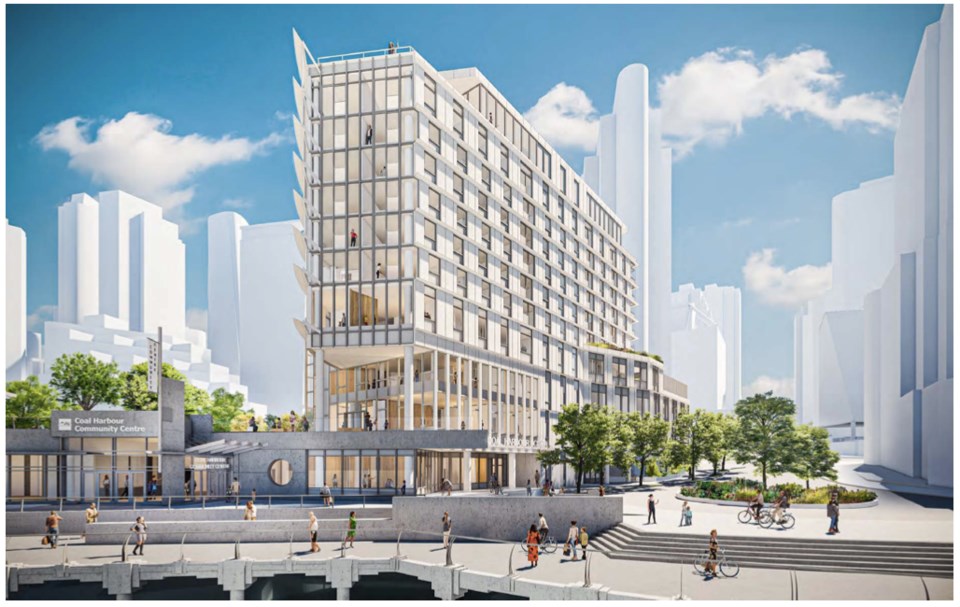The federal government announced Friday (July 29) a $7 million contribution towards the construction of an $81-million project in Vancouver’s Coal Harbour neighbourhood that includes social housing, a school and childcare.
The money is to assist builders of the 11-storey tower to meet “net zero energy and passive house” standards, according to Vancouver-Granville MP Taleeb Noormohamed, who made the announcement at city hall on behalf of Minister of Natural Resources, Jonathan Wilkinson.
“Once completed, the fully electrical building will emit 94 per cent less GHG emissions than a standard building,” Noormohamed said. “It will also improve indoor air quality, reduce water consumption and maximize the building's overall energy performance, making those homes safer, more comfortable and more affordable.”
Waterfront land
“Passive house” is a world-leading standard to create energy efficiency in buildings. The construction concept is meant to reduce a building’s ecological footprint by adding features such as proper ventilation, insulation and thick pane windows to a project.
The building is under construction at 480 Broughton St. on waterfront land the city has owned since 1996. The site already has a community centre, which was completed about a decade ago.
The first three levels of the new development will provide a 340-student, 14-classroom elementary school with a gym, library and multi-purpose room. A licensed 65-space childcare facility will be built on level four and 60 social housing homes on levels five to 10.
Vancouver council approved the project despite pushback from some residents concerned about their waterfront views being blocked, more traffic coming to the neighbourhood and the suggestion that the area already had enough social housing.
'15-minute city'
Mayor Kennedy Stewart, who joined Noormohamed for the announcement, defended the project, saying it was a model for future developments because of the way it incorporates a school, childcare facility and homes for people on low incomes.
“Essentially, you're building a 15-minute city right into one place for the life of the residents,” Stewart said. “So I do think that this is the best way forward for all cities in the middle of a climate crisis and affordability crisis.”
Stewart said change is “always tough” in neighbourhoods and acknowledged people are generally under pressure with affordability, inflation and interest rates and can’t take one more change.
“But I think this is a change that they'll all get behind because it's so wonderful for the families that are involved here,” the mayor said.
Taneen Rudyk, president of the Federation of Canadian Municipalities (FCM), told reporters that an estimated $700,000 will be split among Soroptimist International of Vancouver, John Howard Society of Victoria, the Sooke Region, Greater Victoria Housing Society, Capital Region Housing Corporation and Gabriola Housing Society to fund plans and studies for 497 future homes.
The total $7.7 million package announced Friday comes via the FCM’s Green Municipal Fund’s sustainable affordable housing initiative.
'Ravages of the pandemic'
Rudyk noted how COVID-19 has had an impact on the country’s health care system, businesses and municipalities, yet efforts are still being pushed forward to fight climate change.
“Despite the ravages of the pandemic in communities across Canada, local governments — big and small — have continued to push towards fewer greenhouse gas emissions, net zero energy and environmental sustainability,” she said.
“Today is about orders of government working together for a vibrant and inclusive recovery. Solutions are possible and local governments are ready.”
As of 2017, all rezoning applications submitted to the City of Vancouver require projects to meet near zero standards or low emissions targets.
@Howellings




